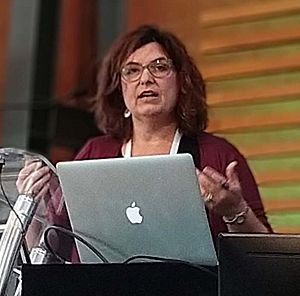Carolyn Lawrence-Dill facts for kids
Quick facts for kids
Carolyn Lawrence-Dill
|
|
|---|---|
 |
|
| Born | May 18, 1974 El Paso, Texas, U.S.
|
| Alma mater | University of Georgia Texas Tech University Hendrix College |
| Known for | Plant science data access and availability; gene function prediction tools and resources; making phenotype descriptions computable, research community-building |
| Scientific career | |
| Fields | Plant Biology Bioinformatics |
| Institutions | Agricultural Research Service, Iowa State University, Colorado State University |
| Doctoral advisor | R. Kelly Dawe & Russell L. Malmberg |
Carolyn Joy Lawrence-Dill (born May 18, 1974) is an American plant biologist. She creates computer tools and systems. These tools help scientists study plant genetics (how traits are passed down) and genomics (all the genes in a plant). This research helps improve plant breeding, which means growing better plants.
Contents
Early Life and Education
Carolyn Joy Lawrence-Dill was born in El Paso, Texas. She grew up in Throckmorton and later Cleburne, Texas. She finished high school in 1992.
She earned a bachelor's degree in biology from Hendrix College in 1996. In 1997, she received her master's degree in biology from Texas Tech University. There, she studied cotton plants. She then earned her Ph.D. (a high-level degree) in botany from the University of Georgia in 2003. Her Ph.D. work focused on using both traditional and computer methods to figure out what genes do in plants.
Career Highlights
After her studies, Dr. Lawrence-Dill worked as a postdoctoral researcher at Iowa State University. This means she did research after getting her Ph.D.
In 2005, she started working for the USDA-ARS. This is a part of the U.S. government that does agricultural research. She directed MaizeGDB, a database for maize (corn) research, until 2013.
In 2014, she became a professor at Iowa State University. She was promoted to full professor in 2019. In 2021, she took on leadership roles at the Iowa State University College of Agriculture and Life Sciences. In 2024, she became the Dean of the College of Agricultural Sciences at Colorado State University.
Plant Research
Dr. Lawrence-Dill's research helps us understand plants better. She works on mapping plant genomes (all their genetic information). She also predicts what different proteins do. A big part of her work is finding new ways to connect genes to what plants look like (their traits) and how they grow. She also creates computer tools to help other scientists do this research. While her work covers many plants, she focuses a lot on maize (corn).
Understanding Plant Genes
Dr. Lawrence-Dill has made it easier for plant scientists to use genomics information. She helps sequence and put together plant genomes. She also helps identify important parts of genes and creates tools for scientists to study how genes work.
Studying Plant Traits
Her work also improves how scientists study plant traits, called phenomics. She connects images of plant traits to their genetic data. She also uses "crowdsourcing" (getting help from many people) to analyze plant images. This helps manage information from large-scale plant studies in fields and labs.
Leadership and Science Policy
Sharing Research Data
A lot of Dr. Lawrence-Dill's work focuses on making research data easier to share. This helps scientists use each other's discoveries. Some scientists worry about sharing their data. But sharing data helps everyone check if research results are correct and can be repeated. When genetic data is shared, it helps researchers find new ways to use plant materials.
Climate and Genetic Engineering
Dr. Lawrence-Dill often talks about important topics like climate change and genetic engineering. She advises scientists to discuss these topics with others, including lawmakers and the public. She believes in finding common ground and showing the good things that can come from science.
In 2016, Dr. Lawrence-Dill and a sociologist named Shawn Dorius studied public opinions on GMOs (Genetically Modified Organisms) and climate change. They looked at how GMOs were shown in news reports. They found that some foreign news sources presented GMO topics very differently from U.S. media. This research helped show how different groups might try to influence public opinion on science topics. Their findings were shared widely in the news.
Building Science Communities
Dr. Lawrence-Dill helps bring researchers together. She works to create common rules and names for scientific terms. She has also helped start science organizations and encourages new scientists through mentoring and training.
Awards
- 2023 Maize Genetics Cooperator Award
- 2020 YWCA Women of Achievement award for helping eliminate racism and empower women
- 2013 Gamma Sigma Delta Induction
- 2009 USDA-ARS Midwest Area Equal Opportunity Award for outreach to American Indians about plant genetics
Elected Service
- 2018 International Plant Phenotyping Network Board (co-chair)
- 2018 North American Plant Phenotyping Network Executive Board (chair in 2019; helped start the organization)
- 2016 DivSeek International Network Steering Committee (member)
- 2010 Maize Genetics Executive Committee (chair in 2015)

